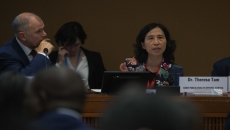Student loan borrowers were targets for scams before the coronavirus pandemic hit. The longer people struggle, the more desperate they become, and that’s when scammers and fraudsters thrive.
“They’re using the same playbook, but more aggressively,” says Seth Frotman, executive director of the Student Borrower Protection Center, a Washington, D.C.-based non-profit.
There’s no single scam related to coronavirus relief or specific company to pinpoint that is being prosecuted right now, says Leslie Tayne, a debt-relief attorney and founder of Tayne Law Group. But fraudsters are still out there.
There are two main types of scams, says Frotman. In one scam, a company will charge to enrol you in a benefit you could have accessed for free, such as a federal income-driven repayment plan.
Tayne says she most often sees scammers promising to get borrowers into a loan deferment program in exchange for payment.
In another scam, you’re promised something too good to be true — like forgiveness — in exchange for payment. Then they take your money and run.
“It used to be called the Obama Loan Forgiveness scam, and now there’s the CARES Act Forgiveness scam,” says Persis Yu, director of the non-profit National Consumer Law Center’s Student Loan Borrower Assistance Project.
“Borrowers should always look upon advertising that is promising forgiveness with skepticism,” says Yu. No student loan forgiveness was included in the March coronavirus relief package.
HOW TO FIGURE OUT WHAT IS LEGIT
As you’re assessing what is real and what is not, take a beat to independently verify a company on third-party sites like the Better Business Bureau’s. Here’s what else you can do:
See if there are news stories about scams alongside a business’s name in an online search. Remember: Anyone can pay for a domain name and start a website. Logos, addresses and mailers are easy to replicate, too.
Be wary of solicitations that arrive in your inbox or that you see on social media ads. Even if you’re contacted by a party that has your personal information, it doesn’t mean it’s a legitimate organization, says Tayne.
If you get a robocall regarding student loan repayment during the coronavirus pandemic, don’t call back. The Federal Communications Commission has seen these and is warning consumers not to fall for these scams.
REAL RELIEF MEASURES AVAILABLE FOR BORROWERS
The coronavirus relief package did include provisions for most federal student loan borrowers, but not private loan borrowers. Individual private lenders are offering benefits such as short-term emergency deferment or waived late fees.
Federal loan borrowers are in the midst of a six-month automatic forbearance — with no interest — retroactive to March 13 and lasting through Sept. 30, 2020. Borrowers with loans in default also get relief from collection activities like wage garnishment.
However, the implementation of these benefits hasn’t been smooth, says Yu. The National Consumer Law Center and another non-profit, Student Defence, sued the U.S. Department of Education over allegations that the department continued garnishing wages despite the provision in the law that prohibits it.
Implementation mistakes have left borrowers more vulnerable to getting scammed, says Yu.
“They’re desperate, and they might be entitled to relief and they’re not getting it,” she says. “Our policymakers and the Department of Education need to step up to get this right so borrowers are not driven to companies leeching off their desperation.”
You should be receiving all relief automatically for federal loans. If you’re not, contact your servicer and make a complaint in writing.
WHAT TO DO IF YOU’VE BEEN SCAMMED
If you’ve been scammed, the first thing you need to do is get control of your accounts.
“One common iteration of these scams is the company will take over the FSA ID or servicer account and redirect any communications to that company,” says Yu. (The FSA ID is the unique username and password used to log into the federal student aid online system.)
— If you’ve given a scam company your password, change your password. You may need to change the email address your account is linked to.
— Make sure to report the scam to authorities as well, says Tayne, and hold onto copies of those reports.
— The Federal Trade Commission, your state attorney general and the Consumer Financial Protection Bureau are options for reporting scams. Each one actively pursues student loan scammers, but they rely on borrowers to self-report.
— If you’re looking to take legal action, contact a legal services organization (if you’re income-eligible) or hire a lawyer.
Frotman, Yu and Tayne each said that borrowers sometimes get their money back, but it takes effort.






